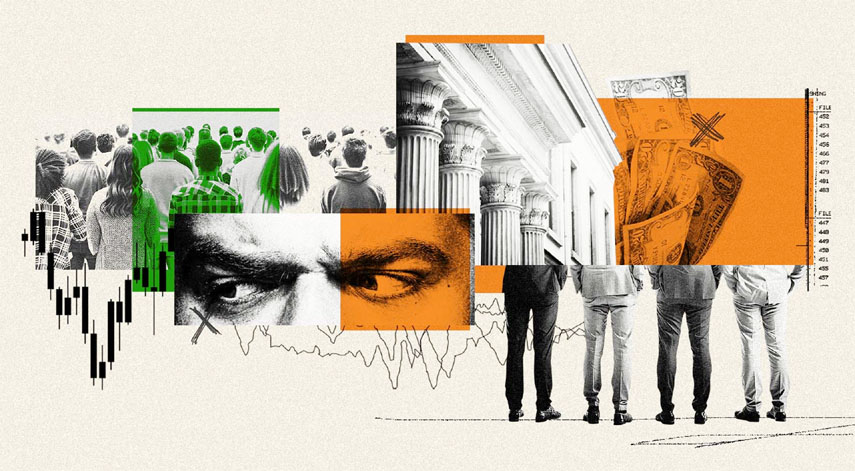Why are populists ahead in many ways?

Rusaid Ahmed :
In the late 19th century, the rise of populism dramatically reshaped global politics. Rather than adhering to a single ideological framework, politicians began prioritizing agenda-setting, rhetoric, propaganda, and nationalist appeals to gain public support.
The foundations of populism were laid in Europe between the 1920s and 1930s, gaining new momentum under authoritarian leaders such as Adolf Hitler in Germany and Benito Mussolini in Italy. Hitler himself acknowledged in his autobiography that influencing people through grandiloquent rhetoric was far easier than using any other method.
While populist leaders are often criticized for their bombastic speeches and controversial commitments, they have consistently demonstrated an edge over liberals in implementing rigid policies. Observing figures like Hitler and Mussolini in the past-or more recent leaders such as Donald Trump, Viktor Orbán, and Narendra Modi-makes this fact evident.
Aggressive in fulfilling ambitious promises
Populist politicians habitually make ambitious promises to their citizens, aiming to project an image of unwavering commitment to their principles. Their rhetoric often includes strong nationalist sentiments.
For instance, after assuming power, Hitler consistently emphasized the notion of German racial purity. Similarly, before running for a second term as U.S. President, Donald Trump pledged to safeguard the “purity” of American blood by cracking down on illegal immigration.
This pledge materialized immediately after his second inauguration when he signed an executive order titled “Protecting the Meaning and Value of American Citizenship.” The order, effective from February 19, 2025, prohibited birthright citizenship for children born to non-citizens in the United States.
Such examples highlight how populist leaders aggressively pursue their commitments. By doing so, they not only strengthen their personal brand but also expand their political capital for future elections.
Emphasis on national economy
Throughout history, populist political forces have focused on national economic development and domestic production. Regardless of other circumstances, the public tends to favor economic growth as a sign of national progress.
For this reason, populist leaders often advocate for economic independence and promote the expansion of private enterprises. They entice citizens with promises of economic advancement while simultaneously imposing new taxes and increasing tariffs on imports.
One of the primary economic models embraced by populists is free-market capitalism. In 2019, Brazilian right-wing President Jair Bolsonaro strongly supported a trade agreement between the European Union (EU) and Mercosur nations, championing the principles of free trade. Likewise, Donald Trump imposed additional tariffs on goods imported from Canada, Mexico, and China, reinforcing his protectionist stance.
Championing traditional values
Another key characteristic of populists is their tendency to portray themselves as the guardians of specific cultural and moral values. Their campaigns and policies frequently emphasize nationalism, religious traditions, and conservative ideals.
For example, Hungarian Prime Minister Viktor Orbán, has enacted anti-immigration laws under the pretext of protecting Hungary’s Christian heritage. His policies have also contributed to the spread of Islamophobia in the country.
Similarly, Indian Prime Minister Narendra Modi, has pushed Hindu nationalist policies, banning cow slaughter and implementing the controversial Citizenship Amendment Act (CAA). Meanwhile, Trump has actively courted Evangelical Christian support in the U.S., and Bolsonaro campaigned with the slogan “Brazil above all, God above all” while launching crackdowns on drug abuse and LGBTQ+ rights.
By championing these values, populist leaders evoke nostalgia and encourage people to believe that restoring national greatness requires preserving traditional norms. This strategy helps them consolidate their voter base.
Distrust of bureaucracy
Populists politicians frequently express skepticism toward bureaucratic institutions, arguing that they are corrupt, disconnected from the people, and inefficient. As a result, they often challenge administrative structures and advocate for direct decision-making by the populace.
During first presidential term, Donald Trump undermined bureaucratic authority by reshuffling administrative bodies and limiting their influence. Similarly, Bolsonaro, often dubbed “the Trump of Latin America,” consistently criticized bureaucratic institutions and sought to exert control over government agencies during his tenure.
This approach allows populists to present themselves as “outsider leaders”, who are battling against the existing system. Consequently, the public perceives them as rebels fighting on their behalf, garnering sympathy and support.
Effective use of public sentiment
Populist leaders understand the significance of public sentiment in politics. They skillfully manipulate emotions to rally support, often fostering an unwavering base of followers. The aftermath of Trump’s 2020 election loss, which led to the Capitol Hill riot, exemplifies how deeply populist rhetoric can influence supporters.
Additionally, during economic or social crises, populists often direct public frustration toward a specific group. Amid the European migration crisis, leaders like Italy’s Giorgia Meloni, Hungary’s Viktor Orbán, and Britain’s Boris Johnson and Rishi Sunak have led anti-immigration campaigns. In the U.S., Trump’s administration took a hardline stance against undocumented immigrants.
The ability to channel public emotions is the greatest strength of populists. They use it to create an “us vs. them” narrative, portraying their opponents as enemies while positioning themselves as the defenders of the people.
Ultimately, the effectiveness of populist leaders stems from their ambitious promises, emphasis on economic nationalism, advocacy for traditional values, distrust of bureaucracy, and skillful manipulation of public emotions. This explains why, despite predictions in the 1960s that right-wing populism would decline globally by 2018-an assertion made by MIT professor Ithiel de Sola Pool-populism continues to thrive in modern politics.
The writer is a young columnist and translator.
(Student, Department of Mass Communication and Journalism,
Begum Rokeya University, Rangpur. Email: [email protected])
